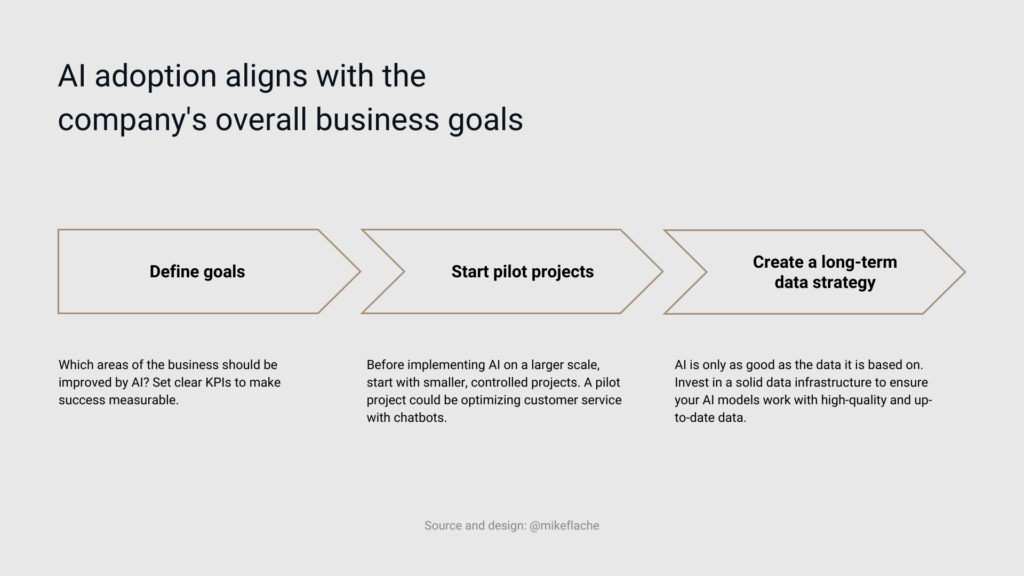Key takeaways
- AI as the key to competitiveness: artificial intelligence offers CEOs the opportunity not only to optimize existing processes but also to develop data-driven business models that secure long-term competitive advantages.
- Strategic implementation of AI: the successful integration of AI begins with a clear strategy aligned with business goals. Pilot projects and a solid data strategy are crucial steps to a successful AI implementation.
- AI as a growth driver: companies that invest early in AI and use innovative technologies such as Generative AI will not only achieve efficiency gains in the coming years but will also open up new markets.
The world of business management is changing rapidly – and nothing is driving this change as much as artificial intelligence (AI).
CEOs worldwide are realizing that AI can not only optimize processes but revolutionize entire business models. But how can AI be meaningfully integrated into existing structures, and what concrete steps should decision-makers take now to prepare their company for the future?
Today’s edition of CEO Insight highlights the most important strategic considerations and provides practical tips for implementing AI technologies.
1. Understanding the potential of AI for business models
Artificial intelligence can add value in almost all company areas – from automating administrative tasks to optimizing the supply chain.
The real value of AI, however, lies in its ability to enable data-driven business models. Many of us know companies like Amazon and Netflix are already using AI to tailor their offerings to customers’ individual needs, thereby increasing sales and customer satisfaction.
For CEOs, this means that AI is not just a technology but a key to remaining competitive. It’s not just about making existing processes more efficient but also about developing new value-creation models.
2. Best practices when implementing AI
Implementing AI doesn’t start with technology, it starts with strategy.
CEOs should ensure that AI adoption aligns with the company’s overall business goals.
Here are some best practices:
- Define goals: Which areas of the business should be improved by AI? Set clear KPIs to make success measurable.
- Start pilot projects: Before implementing AI on a larger scale, start with smaller, controlled projects. A pilot project could be optimizing customer service with chatbots.
- Create a data strategy: AI is only as good as the data it is based on. Invest in a solid data infrastructure to ensure your AI models work with high-quality and up-to-date data.

3. Future outlook: AI as a growth engine
Although AI is currently experiencing media hype, I still see the development of AI technologies in its early stages. And the possibilities are limitless.
In the coming years, AI will become even more integrated into companies’ decision-making processes – from automated workforce planning to dynamic pricing in real-time.
Companies that invest in AI now and adapt their business models will be among the winners of the next decade.
One of the most exciting developments is the use of generative AI. It enables companies to create content, design products, and even develop innovative solutions to customer problems – all fully automatically.
CEOs who recognize and exploit this potential early on can not only increase their efficiency but also open up new markets.
Conclusion
Artificial intelligence is more than a trend – it is a transformation factor that will shape the future of business.
CEOs should act now to ensure that their company not only follows this development but actively shapes it. Set clear goals, test pilot projects, and build a data strategy to successfully embed AI into your business model in the long term.
Take action today
Discuss with your management team which pilot projects in the field of AI you can start within the next six months. Start with small steps – and get ready for the significant growth potential.

